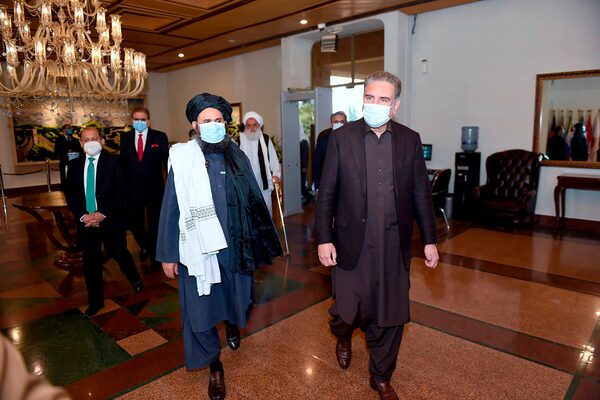
In this photo provided by Pakistan's Ministry of Foreign Affairs, Pakistan's Foreign Minister Shah Mahmood Qureshi, right, and Mullah Abdul Ghani Baradar, head of a Taliban political team, arrive with other members of their delegations for talks at the Foreign Ministry, in Islamabad, Pakistan, on Dec. 16, 2020.Anjum Naveed/The Associated Press
A Taliban team, led by the co-founder of the insurgent movement, arrived Wednesday in Islamabad for talks with Pakistani government leaders amid growing calls for a reduction in violence in neighbouring Afghanistan.
The visit came as the Taliban unleashed a wave of attacks in Afghanistan, striking in northern Baghlan and southern Uruzgan province late on Tuesday and early Wednesday. At least 19 members of the Afghan security forces and 11 Taliban fighters were killed in fierce battles, officials said.
Mullah Abdul Ghani Baradar and his delegation were summoned to Islamabad from Qatar, where they have been negotiating since September with Afghan government representatives, officials close to the talks said. The visit comes on the heels of U.S. peace envoy Zalmay Khalilzad’s quick trip on Tuesday to Pakistan’s military in the garrison city of Rawalpindi.
The Pakistani military has wielded significant influence over the Taliban and has had links with some of their leaders – then part of the U.S.-backed mujahedeen – dating back to the 1980s and the former Soviet Union’s invasion of Afghanistan. The Taliban emerged in 1994 in response to runaway corruption and violence of mujahedeen warlords who took power from the former communist regime in 1992.
Pakistan was key in getting the Taliban to the negotiation table with the United States in 2018. Those talks eventually led to the U.S.-Taliban deal that was signed in February, providing for the withdrawal of U.S. and NATO troops from Afghanistan.
The deal also paved way for the start of talks between the Taliban and the Afghan government, which began in September in efforts to hammer out a road map for post-war Afghanistan. The talks, after some recent procedural progress, have been suspended till early January and there is speculation the resumption could be further delayed.
Kabul has called for the talks to resume inside Afghanistan while the Taliban insist they continue in Doha, Qatar, where they maintain a political office.
Meanwhile, Washington has been increasingly frustrated by a spike in violence in Afghanistan and calls for a ceasefire have been reaching crescendo in both Kabul and in Washington.
Taliban spokesman Mohammad Naeem tweeted late Tuesday that “a high-level delegation” led by Baradar “left for Islamabad at the official invitation” of Pakistan. The delegation will meet Pakistani Prime Minister Imran Khan in Thursday and met Foreign Minister Shah Mahmood Qureshi, as well as military officials.
However, it is unclear if the Taliban visit to Pakistan would yield any progress toward even a temporary ceasefire in Afghanistan.
Still in a news conference President Donald Trump accelerated the withdrawal of U.S. troops from Afghanistan earlier this month, with another 2,000 troops returning home by early January and leaving just 2,500 American soldiers behind.
The final withdrawal hinges on Taliban fulfilling their commitment to cut off al-Qaeda and other militant groups and ensure that Afghan territory is not used for attacks on the United States. The Islamic State group – a rival of the Taliban – is seen as America’s greatest security threat in Afghanistan.
Khalilzad has called on both sides in the Qatar talks to press toward a political solution, but the stepped-up violence by the Taliban is undermining progress, according to officials familiar with the talks. They spoke on condition of anonymity to discuss the negotiations.
Until now, the Taliban have said a ceasefire would be on the agenda for negotiations but have refused pressure for an immediate end to fighting.
Qureshi, the Pakistani foreign minister, said following meetings Wednesday with Taliban representatives that both sides in the conflict have a responsibility to reduce violence.
“This responsibility cannot be placed on the shoulders of the Taliban alone. All sides will have to play a role,” Qureshi said, adding Pakistan wants to see a reduction of violence that leads to a ceasefire.
In the latest attacks in Afghanistan, Jawed Basharat, spokesman for the provincial police chief in Baghlan province, said the Taliban attacked a police checkpoint near Puli Khumri, the provincial capital.
Taliban spokesman Zabihullah Mujahid, however, claimed that Afghan security forces had shelled civilian areas, prompting a response from the insurgents. Basharat said an investigation was under way into the attack.
A provincial health department official, who was not authorized to speak with the media, said bodies of 13 policemen and five wounded were brought to a city hospital early on Wednesday. One of the wounded died shortly afterward, the health official said.
In the Uruzgan attack, Ahmad Shah Sahil, spokesman for the provincial governor, said a Taliban attack on a checkpoint late on Tuesday in Dehrawad district killed five members of the security forces and wounded two others. He added that at least 11 Taliban fighters were killed and six others were wounded in the fighting there, which ended early in the morning on Wednesday.
The Taliban did not immediately offer any comment on the attack in Uruzgan.
In Kabul, a roadside bomb struck a vehicle early on Wednesday, wounding two people, according to police spokesman Ferdaws Faramarz. On Tuesday, a lawyer was shot and killed in the latest target killings sweeping the country. Afghan police have arrested two suspects in connection with the shooting.
Our Morning Update and Evening Update newsletters are written by Globe editors, giving you a concise summary of the day’s most important headlines. Sign up today.